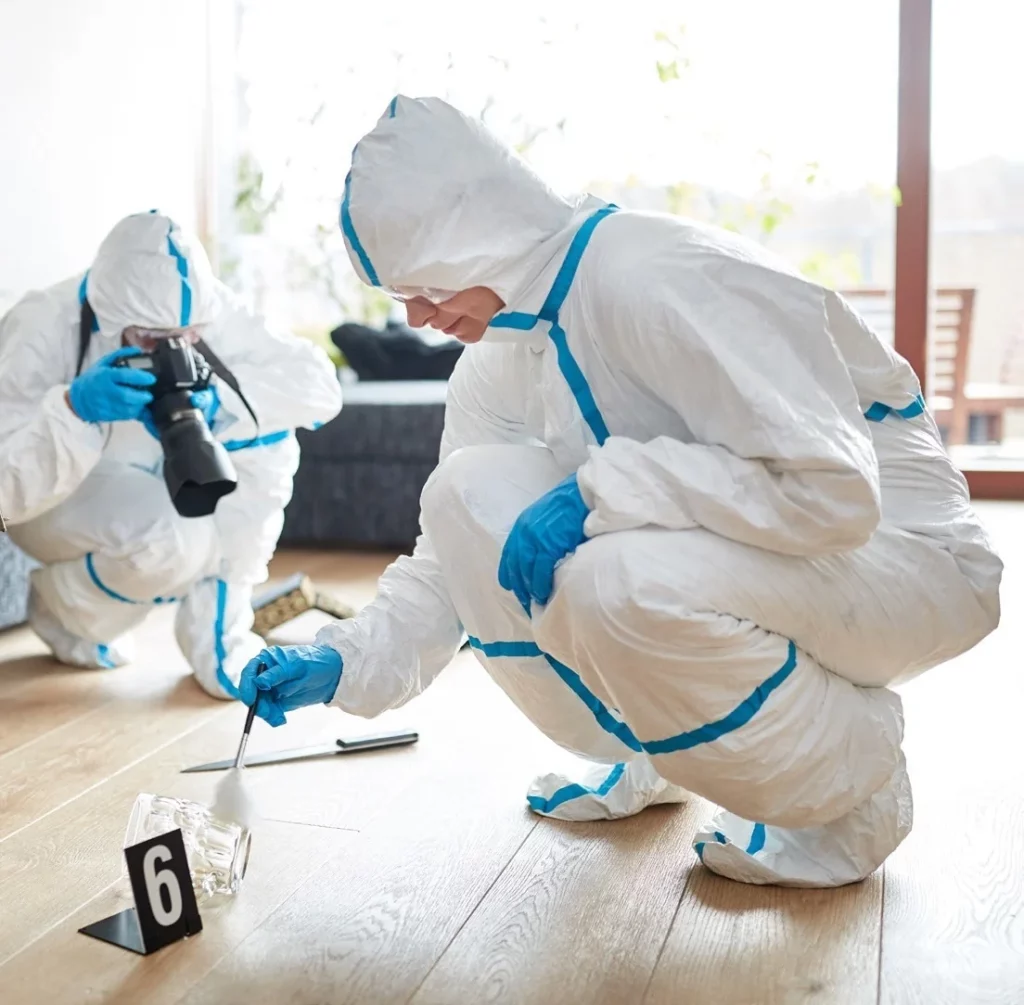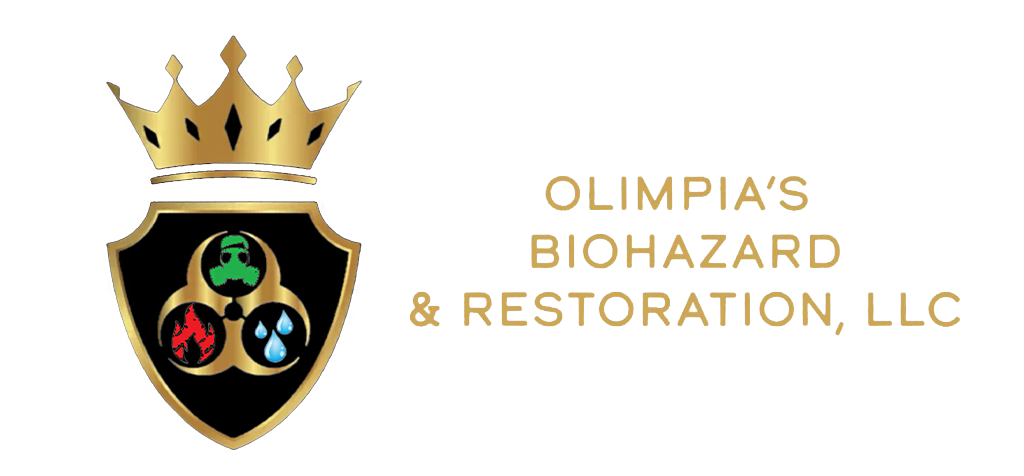Hey there! Today, we’re going to delve into the fascinating world of crime scene cleanup and its connection to forensic investigations in Portland. Crime scenes can be chaotic, messy, and emotionally overwhelming. Once law enforcement authorities have gathered evidence, crime scene cleanup teams step in to restore the area to its pre-incident state. But their role isn’t just about tidying up; it also intersects with the crucial work of forensic investigators. Discover the vital connection between crime scene cleanup and forensic investigations. Rely on Olimpia’s Biohazard & Restoration LLC for expert services.
Relationship between crime scene cleanup and forensic investigations:
In this article, we’ll explore the symbiotic relationship between crime scene cleanup and forensic investigations, shedding light on the vital role both play in ensuring justice is served and communities heal.


Crime Scene Cleanup – Beyond the Surface
When you think to choose crime scene cleanup service, you might picture people in protective suits and masks scrubbing away bloodstains. While that’s part of it, crime scene cleanup goes much deeper than surface cleaning. These dedicated professionals are trained to deal with biohazardous materials, including bodily fluids and tissues, ensuring safe and proper disposal. But how does this connect to forensic investigations? Well, during the cleanup process, valuable evidence may be discovered, overlooked during the initial investigation. Crime scene cleaners must work closely with forensic investigators to preserve and collect potential clues to aid in solving the case.
Preserving the Chain of Custody
Maintaining the chain of custody is of utmost importance in any criminal investigation. This chain ensures that the evidence’s integrity remains intact from the moment it’s collected until it reaches the courtroom. Forensic investigators meticulously document and label items at the crime scene. When crime scene cleanup commences, they must collaborate closely to ensure nothing is accidentally discarded or tampered with. Proper communication between these two teams guarantees that potential evidence, such as fingerprints, DNA samples, or trace materials, is handled with care and respect for the legal process, maintaining its admissibility and probative value.
Communicating and Coordinating
Effective communication and coordination between crime scene cleanup crews and forensic investigators are critical for the success of an investigation. Both teams are likely to be present at the crime scene simultaneously or in quick succession. They must work harmoniously, with the cleanup crew being sensitive to the investigators’ needs for evidence collection before diving into their task. Furthermore, if the investigators require certain areas to remain undisturbed during cleanup, clear communication ensures those spaces remain untouched until they have concluded their examination. This collaboration guarantees a seamless transition from the crime scene examination to the cleanup process.
Disposal of Hazardous Materials
Biohazardous materials at crime scenes, such as blood, bodily fluids, and tissues, pose significant health risks if not handled properly. Crime scene cleanup experts are well-versed in the safe disposal of these materials, adhering to strict protocols and regulations. This expertise extends beyond mere cleanup duties – it can provide valuable insights to forensic investigators. For instance, the manner in which hazardous materials are found and the extent of their presence may indicate crucial details about the crime itself. Close cooperation between both teams ensures that potential evidence isn’t mistakenly disposed of and lost forever.
Trauma and Emotional Support
Crime scenes can be emotionally devastating for victims’ families and the community. Crime scene cleanup professionals are not only responsible for restoring the physical environment but also for approaching their work with empathy and understanding. Similarly, forensic investigators are exposed to the emotional impact of the crimes they investigate. Collaborating with cleanup teams allows investigators to focus on their primary duties, knowing that the aftermath will be handled compassionately. Additionally, crime scene cleaners may encounter valuable witnesses who are more willing to share information while the cleanup team’s focus is on restoring order.
Efficient Turnaround and Investigation Closure
A swift yet thorough crime scene cleanup is essential for the community’s well-being and closure for the victims’ loved ones. The cooperation between crime scene cleanup and forensic investigators plays a pivotal role in this process. With clear communication, well-defined roles, and respect for each other’s work, both teams can ensure an efficient turnaround. The quicker the crime scene is cleaned and released, the sooner the investigators can analyze all gathered evidence. Consequently, this contributes to a more comprehensive investigation and a timely resolution to the case, bringing justice to those affected.
Learning and Advancement
Every crime scene presents unique challenges and learning opportunities. Through the collaboration between crime scene cleanup and forensic investigations, both teams can continuously improve their methods and strategies. As cleanup professionals encounter various scenarios, they gain insights that they can share with investigators, leading to enhanced evidence preservation techniques. Conversely, forensic investigators’ feedback helps the cleanup crews understand the importance of specific evidence and how their actions during cleanup can impact an investigation. This mutual learning and advancement contribute to the continuous improvement of crime scene management and investigation procedures.
The Vital Role of Crime Scene Cleanup
Before we dive into the connection with forensic investigations, let’s understand the critical role crime scene cleanup plays on its own. Beyond the visible mess, crime scene cleanup professionals handle biohazardous materials and employ specialized techniques to sanitize and decontaminate the area. They restore order to a scene that has been disrupted by tragedy, allowing families and communities to begin healing. Crime scene cleaners must be diligent and meticulous in their work to maintain the integrity of the site and ensure the safety of everyone involved.
Forensic Investigations – Unraveling the Truth
Now, let’s shift our focus to forensic investigations. These skilled professionals are responsible for collecting, analyzing, and interpreting evidence to reconstruct the events of a crime accurately. Their work often involves examining physical evidence, conducting autopsies, and analyzing digital data. Forensic investigators are essential in establishing the facts of a case, identifying suspects, and providing crucial information for the justice system. Their findings can make or break a case, impacting the lives of victims, suspects, and the community at large.
Conclusion
In conclusion, the connection between crime scene cleanup and forensic investigations in Portland is undeniable. These two critical components of the criminal justice system work hand-in-hand to ensure justice is served and communities can heal after traumatic events. Through effective communication, coordination, and empathy, crime scene cleanup teams and forensic investigators create a harmonious partnership, ultimately leading to more efficient investigations and closure for those affected. Moreover, their collaboration fosters a continuous learning process, advancing their respective fields and contributing to the improvement of crime scene management practices for the benefit of all.
